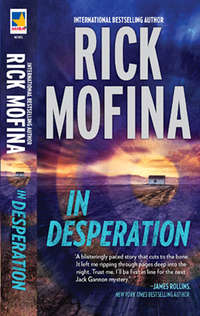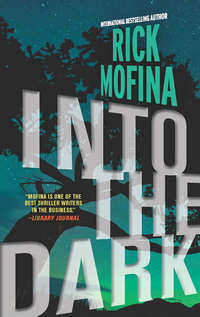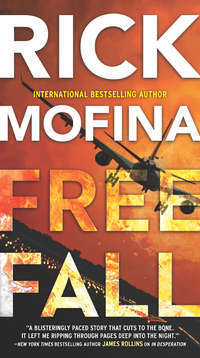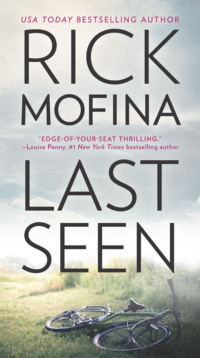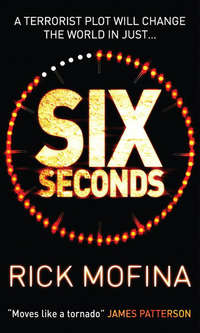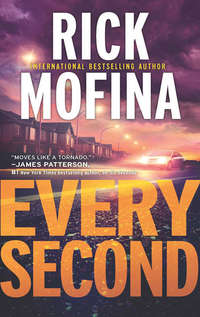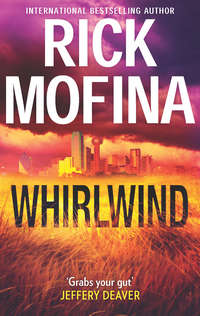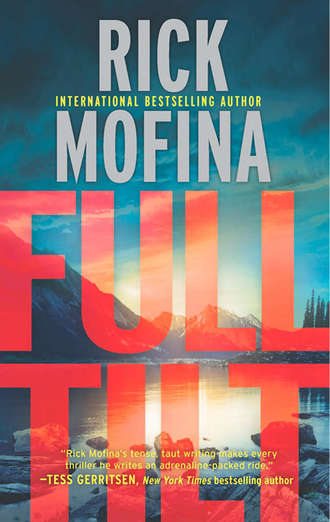
Полная версия
Full Tilt

SCREAMS IN THE NIGHT...
Deep in the woods of upstate New York a woman flees a blazing barn. She is burned beyond recognition, and her dying words point police to a labyrinth of “confinement rooms”—rooms designed to hold human beings captive—where they make other chilling discoveries.
A GUT-WRENCHING PHONE CALL...
In Manhattan, Kate Page, a single mom and reporter with a newswire service, receives a heart-stopping call from a detective on the case. A guardian angel charm found at the scene fits the description of the one belonging to Kate’s sister, Vanessa, who washed away after a car crash in a mountain river twenty years ago.
A LIFE-AND-DEATH RACE AGAINST TIME
Kate has spent much of her life searching for the truth behind her little sister’s disappearance. Now, a manhunt for a killer who’s kept a collection of victims prisoner for years without detection becomes her final chance to either mourn Vanessa’s death—or save her life.
Praise for the novels of Rick Mofina
“A compelling novel that’s impossible to put down. The exciting plot is edgy and fast-paced with many suspenseful twists leading to an intensely thrilling ending. Mofina is at the top of his game.”
—FreshFiction on Whirlwind
“With the exciting plot and a conclusion that is a true surprise to one and all, this is one book that has to be seen ASAP.”
—Suspense Magazine on Into the Dark
“Mofina is one of the best thriller writers in the business.”
—Library Journal (starred review) on
They Disappeared
“Rick Mofina’s tense, taut writing makes every thriller he writes an adrenaline-packed ride.”
—Tess Gerritsen, New York Times bestselling author, on The Burning Edge
“A blisteringly paced story that cuts to the bone. It left me ripping through pages deep into the night.”
—James Rollins, New York Times bestselling author, on In Desperation
“Taut pacing, rough action and jagged dialogue feed a relentless pace. The Panic Zone is written with sizzling intent.”
—Hamilton Spectator
“Vengeance Road is a thriller with no speed limit! It’s a great read!”
—Michael Connelly,
New York Times bestselling author
“Six Seconds should be Rick Mofina’s breakout thriller. It moves like a tornado.”
—James Patterson,
New York Times bestselling author
Also from Rick Mofina and MIRA Books
WHIRLWIND
INTO THE DARK
THEY DISAPPEARED
THE BURNING EDGE
IN DESPERATION
THE PANIC ZONE
VENGEANCE ROAD
SIX SECONDS
Other books by Rick Mofina
A PERFECT GRAVE
EVERY FEAR
THE DYING HOUR
BE MINE
NO WAY BACK
BLOOD OF OTHERS
COLD FEAR
IF ANGELS FALL
And look for Rick Mofina’s next thriller
featuring investigative reporter Kate Page
EVERY SECOND
coming soon from MIRA Books!
Full Tilt
Rick Mofina

This book is for you, the reader
He healeth the broken in heart,
and bindeth up their wounds.
—Psalms 147:3
Contents
Cover
Back Cover Text
Praise
Booklist
Title Page
Dedication
Bible Verse
1
2
3
4
5
6
7
8
9
10
11
12
13
14
15
16
17
18
19
20
21
22
23
24
25
26
27
28
29
30
31
32
33
34
35
36
37
38
39
40
41
42
43
44
45
46
47
48
49
50
51
52
53
54
55
56
57
58
59
60
61
62
63
64
65
66
67
68
69
70
71
Epilogue
Acknowledgments
Endpage
Copyright
1
Rampart, New York
The old burial grounds.
Nobody ever goes out there.
Chrissie was uneasy about her boyfriend’s birthday wish to “do it” there.
“That place gives me the creeps, Robbie.”
“Come on, babe. Think of it as your first time with an eighteen-year-old man, and our first time in a graveyard. How cool is that?” Robbie sucked the last of his soda through his straw, then belched. “Besides, we’ve done it everywhere else in this dog-ass town.”
Sad but true. There was not much else to do here.
Rampart was a tired little city in Riverview County, at the northern border of New York. It was home to small-town America—flag-on-the-porch patriots, fading mom-and-pop shops, a call center for a big credit card company, a small Amish community and a prison.
The way Chrissie saw it, all people in Rampart did was work, get drunk, have sex, bitch about life and dream of leaving town.
Except maybe the Amish, she thought—they seemed content.
Chrissie and Robbie had been together for two-and-a-half years. Now, as they sat in his father’s Ford Taurus waiting for the light, she contemplated the dilemma facing them.
She’d been accepted at a college in Florida. Robbie didn’t want her to go. He was getting a job at the prison and was talking about marriage. Chrissie loved Robbie but told him she was not going to stay and be a Rampart prison guard’s wife, working at the mall, driving her kids everywhere while trying not to hit the Amish buggies.
Chrissie wouldn’t be leaving for a couple of months, but Robbie avoided talking about it. He lived in the moment. That was fine, but sooner or later she would have to end it with him.
But not tonight. Not on his birthday.
The light changed and they rolled by the Riverview Mall. Its vast parking lot was deserted and dark.
“So, are you up for the boneyard, babe?”
Robbie was already guiding the Taurus along the highway out of town. The white lines rushed under them and she made a suggestion.
“Why don’t we go to Rose Hill?”
“Naw, we go there all the time.”
Chrissie felt Robbie’s hand on her leg.
“Come on. It’s my birthday.”
“But it’s so freakin’ creepy. Nobody goes out there.”
“That’s what makes it fun.” He rubbed her inner thigh. “I got the sleeping bag in the trunk.”
Chrissie sighed and looked out her window at the summer night.
“Okay.”
The headlights reached into the darkness as they drove beyond town. The Ford’s high beams captured the luminescent eyes of animals watching from the forests along the lonely drive.
After several miles, Robbie slowed to a stop and turned off the road onto an overgrown pathway. It was marked with an old weather-beaten sign that was easy to miss and bore two words: Burial Grounds.
The car swayed and dipped as he drove slowly over worn ruts until they stopped at a no-trespassing sign wired to a gate that was secured with a chain and lock.
“There, see.” Chrissie pointed. “We can’t get in.”
Robbie slipped the transmission into Park.
“Yes we can.”
He got out and went to the gate, his T-shirt glowing against the blackness. Moths fluttered around the headlights as he worked on the lock, and the only sound was the chorus of crickets.
Chrissie knew the area’s history. She’d written about it for a ninth-grade paper.
In the late 1800s, the state built a large insane asylum in Rampart. It had its own cemetery because locals didn’t want patients buried next to their loved ones. When the asylum was closed down forty years ago, all the headstones had been removed and grave sites kept secret to protect the families’ privacy. There was nothing there now but a stretch of green grass bordered by lush woods.
Robbie unlocked the lock, the chain jingling as he removed it and opened the gate. After edging the car through, he closed it.
“How did you open that lock?”
“Trev’s dad works with DOT and he told me that if you give that old lock the right twist, it’ll open.”
Robbie drove slowly along the wooded border of the graveyard, cut the engine and killed the lights.
Stars blazed above.
Guided by the light of Robbie’s phone, they walked to a remote section where the grass was like thick carpet. They unrolled the sleeping bag.
“Nothing around but the crazy dead under us.”
“Shh, birthday boy.”
Robbie slipped his hands around Chrissie’s waist then under her shirt and jeans. They kissed and as her fingers found his zipper she froze, pulled away and looked into the pitch-black forest.
“What is it?”
“Something’s out there!”
Robbie followed her gaze to flames, flickering deep in the woods.
“What’s that?” Chrissie held Robbie tighter.
“I don’t know. There’s nothing there for acres.”
“There’s an old barn the asylum used years ago, but—”
A faint, distant scream—a woman’s scream—carried from the fire.
“Oh, God, Robbie!”
“What the hell?”
More screaming, this time louder, pierced the night, raising gooseflesh on Chrissie’s skin.
“Help me! Please! Help me!”
Robbie grabbed Chrissie’s hand and started for the woods leading to the fire—but she yanked him back.
“Let’s take the car!”
“I don’t know if we can get through!”
“We’ll be safer in the car, Robbie!”
They ran to the car, dragging the sleeping bag.
Robbie fumbled for his keys, turned the ignition and headed the car down the path that seemed to vanish into the woods ahead.
The flames were growing.
Chrissie called 911.
“I want to report a fire and a woman screaming for help!”
As they followed the trail, knifing into a thick wall of trees and undergrowth, Chrissie guessed they were about one hundred yards from the fire. She gave the dispatcher directions and was assured that fire, paramedics and police were on the way.
Leafy branches continued scraping and slapping at the car. Robbie drove carefully over the rugged road.
“My old man will kill me if I scratch the Taurus!”
Underbrush and stones smacked at the undercarriage as they came to a clearing, gasping at the sight before them.
The old barn was engulfed in flames, the fire raging against the night sky.
A woman ran from it shrieking, trailing smoke and sparks. The flames that were devouring her entire body flapped like horrific flags as she staggered and collapsed into a burning heap in front of the car.
Chrissie screamed.
Robbie grabbed the sleeping bag, rushed to the woman and smothered the flames. While the inferno of the barn crackled and roared, Chrissie’s screams were soon overtaken by the approaching sirens.
The woman groaned in agony.
As Robbie tried to take her hand, which was now a blackened hook, they saw charred ropes tied to her wrists.
2
Rampart, New York
Oxygen flowed in a soft, calibrated rhythm through the ventilator tube connected to the burn victim in the intensive-care unit of Rampart General.
The small screen above her bed monitored her heart, her blood pressure and her other vital signs.
An IV pole with a drip stood beside her bed.
She was wrapped from her head to her ankles in gauze and was heavily sedated to alleviate the excruciating pain of third-degree burns to over 85 percent of her body.
She’d lost her hair, ears, face, nearly all of her skin.
Her feet were charred stumps, her hands charred claws.
Her injuries were fatal. She would not live through the night, the doctor had told Detective Ed Brennan of Rampart Police Department.
Since then Brennan had waited with the ICU nurse by the woman’s bedside, never leaving it.
He’d been home when he got the call.
His wife had put their son to bed. He’d made popcorn and they were watching the end of The Searchers, when his cell phone rang.
“White female, mid-twenties,” Officer Martin had told him over blaring sirens. “Found her near the old burial grounds. Burned bad. They’re taking her to the General—they don’t think she’ll make it. Looks like she was tied up, Ed.”
Brennan rushed to the hospital in the hopes of obtaining a dying declaration from the victim.
The doctor took Brennan aside after emergency staff had done what they could for her.
“There’s no guarantee she’ll regain consciousness.”
Brennan needed her to help him solve what would soon be her murder.
In the hours he waited, he’d gotten used to the room’s smell. They had no ID for her. There was no chance of fingerprints and no indication she’d had any clothing or jewelry. If so, it had been burned away. They’d have to review local, state and national missing persons cases.
The most disturbing aspect was the ropes.
Again, Brennan looked at the pictures on his phone that Martin had sent from the scene.
Again, he winced.
Then he concentrated on the charred ropes.
She appeared to have been be bound by ropes.
The fire could’ve allowed her to escape from the building.
Escape from what and from whom?
Once they doused the fire and things cooled off they needed to get the forensic people in there.
“Detective?” the nurse said.
The charred remnants of what was once the woman’s right hand moved.
The nurse pressed a button above the bed and the doctor arrived, checked the monitor and bent over the woman.
“She’s regaining consciousness,” the doctor said. “We’ll remove the airway so she can talk, but remember, her throat and lungs are damaged.”
Brennan understood.
This may be his only shot.
Once the tube was removed, the monitor started beeping as the woman gasped. They took a moment to tend to her and the beeping slowed. Then the doctor nodded to Brennan, who stepped close and prepared to make a video recording with his phone.
“Ma’am, I’m Detective Ed Brennan. Can you tell me your name?”
A long moment of silence passed punctuated with a gurgle.
Brennan took a breath and looked at the doctor before he continued.
“Ma’am, can you tell me a name, or tell me where you live?”
A rasping sigh sounded, then nothing.
“Ma’am, is there anything you can tell me?’
A liquidy, coarse utterance began to form a word.
“Share— R...”
“I’m sorry, ma’am. Try again.”
“There...are...”
Brennan glanced at the doctor and nurse, blinking to concentrate as the woman tried to raise her blackened hand as if she wanted to pull Brennan to her.
“There are...there are others...”
The woman lowered her arm.
The monitors sounded alerts and the tracking lines flattened.
3
Rampart, New York
Brennan whirled his unmarked Impala out of the McDonald’s drive-through and headed for the scene.
He gulped his black coffee but only managed a small bite of the blueberry muffin. His stomach was still tense from the hospital, the victim and her dying words: There are others.
What’re we facing here?
He’d alerted his sergeant and lieutenant. They definitely had a suspicious death. Confirming the victim’s ID would be critical. A forensic odontologist from Syracuse was en route to make the victim’s dental chart. They’d submit and compare everything—height, weight, approximate age, X-rays, DNA—with all the regional and state databases, missing persons cases, and check her teeth with dental associations and with the New York State Police.
Sooner or later we’ll get an ID on her. Then I’ll have to tell her family the worst news they’re ever going to hear.
He hated that part of the job.
As Brennan drove along the highway he focused on his case. They’d need to pull in Rampart’s other detectives to help. The sun was climbing, which was good because they had to scour that scene. He figured the state police Forensic Identification Unit would be there by now.
Rampart PD often drew on the resources of the New York State Police or the FBI because, as a small jurisdiction, Rampart didn’t get many homicides, maybe five or six a year.
You need challenging cases to make you a better detective. Brennan considered the forest rolling by. Like my life.
He was thirty-four and had been with the department for ten years, the past five as a detective with the investigative unit.
At times he yearned to be with the FBI, the DEA or Homeland, something bigger. But his wife, Marie, a teacher, loved their small-town life, saying it was good for Cody. Their son was five and prone to seizures if he got a fever or was overly stressed.
It didn’t happen often, but when it did, it was frightening.
The other day when they were all shopping together at Walmart, Brennan realized that what he had here was good. But when he considered that his last major case was bingo fraud, small-town life got to him. Especially after the weekend call from his high school buddy who was with the Secret Service.
How’s it going there, Ed? I’m protecting the vice president in Paris next week. Are you still chasing the Amish in Ram Town?
Brennan knew that Cody needed the quiet of a small town, but that call had left him reflective.
A cluster of local media vehicles had gathered at the entrance to the burial grounds, which was blocked by a state patrol car. Recognizing Brennan, the trooper waved him through. Brennan ignored questions reporters tossed at his window.
His Chevy rolled alongside the cemetery, then dipped and swayed when he cut into the forest on the old path, which had widened from the increasing traffic. As he reached the scene, the air smelled of burned wood. Smoke curled from the ruins, floating over the clearing in clouds that pulsed with emergency lights from the fire and police units at the site. Brennan parked and went to Paul Dickson, a Rampart detective, and Rob Martin, the first officer to respond. They were huddled with the state guys and firefighters. Brennan, who had the lead on this case, knew most of them and did a round of handshakes.
“Hey, Ed,” Dickson said. “We heard she didn’t make it.”
“No,” Brennan said before shifting to work. “What do we have so far?”
Consulting their notes, Dickson and Martin brought him up to speed. The fire had cooled enough for the forensic guys to suit up. At the same time, Brennan heard a yip and saw the cadaver dog, and its handler in white coveralls and shoe covers, head carefully into the destruction while, overhead, a small plane circled. The state police were taking aerial photos of the scene and mapping it.
“The teens who found her are asleep in my car, waiting to talk to you,” Martin told Brennan.
“Okay, I’ll get to them in a bit for formal statements.”
The barn was state property built in 1901 as part of the farm that grew food for the asylum before it was shut down in 1975 and abandoned.
Brennan took in the piles of rubble, the stone foundation and watched Trooper Dan Larco with Sheba, a German shepherd, probing the scene. As she poked her snout here and there in the blackened debris, her tail wagged in happy juxtaposition to the grim task.
Sheba barked and disappeared into a tangle of wood at one corner. Larco moved after her, lowering himself to inspect her discovery.
“Hey, Ed!” he called. “We got something! Better take a look!”
Brennan pulled on coveralls and shoe covers, then waded cautiously into the wreckage.
The charred victim was positioned on its back beneath a web of burned timber. Most of the skin and clothing were gone. The arms were drawn up in the “pugilistic attitude.” The face was burned off, exposing teeth in a death’s head grin. From the remnants of jeans and boots on the lower body, it appeared the victim was male.
Brennan made notes, sketched the scene and took pictures. The forensic unit would process everything more thoroughly. Maybe they’d yield a lead on identification. In any event, there would be another autopsy.
Now we have two deaths. Is this what the first victim meant when she’d said, “There are others”?
Larco’s radio crackled with a transmission from the spotter in the plane.
“There’s a vehicle in the bush about fifty to sixty yards northeast of the site. A pickup truck, you guys got that?”
A quick round of checks determined that no one on the ground was aware of the vehicle. Two state patrol cars moved to block it. Brennan, Dickson, Martin and some of the troopers approached the vehicle. They took up positions around it with weapons drawn and called out for anyone inside to exit with hands raised.
There was no response.
They ran the plate. The pickup was a late-model Ford F-150, registered to Carl Nelson of Rampart. There were no warrants, or wants for him. A quick, cautious check confirmed the truck was empty. Brennan noticed the rear window bore a parking decal for the MRKT DataFlow Call Center.
He pulled on latex gloves and tried the driver’s door.
It opened.
A folded single sheet of paper waited on the seat.
Brennan read it:
I only wanted someone to love in my life.
It’s better to end everyone’s pain.
God forgive me for what I’ve done.
Carl Nelson
4
Rampart, New York
“Yeah, that’s Carl’s truck. What’s wrong?”
Robert Vander’s eyes flicked up from the pictures Brennan showed him on his phone and he snapped his gum.
“Carl’s been off sick, why’re you asking about him?”
Vander glanced quickly at his computer monitor, a reflex to the pinging of new messages. He was the IT chief at the MRKT DataFlow Call Center, which handled millions of accounts for several credit card companies. With five hundred people on the payroll, it was Rampart’s largest employer.
Vander was Carl Nelson’s supervisor.
“What’s this about?” Vander looked at Brennan, who sat across from his desk, then at Paul Dickson, who was beside Brennan, taking notes.
“We’re checking on his welfare,” Brennan said.
Vander halted his gum chewing.
“His welfare? He called in sick two days ago, said he had some kind of bug. What’s going on?”


